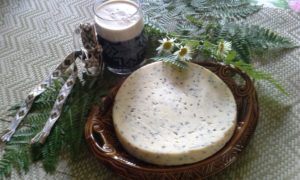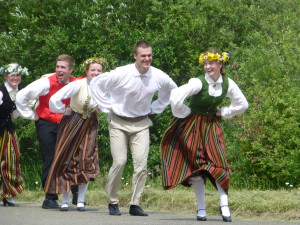In June, during the longest day and shortest night of the year, Latvians celebrate Līgo svētki or Jāņi. Ancient in origins, and arguably one of the most celebrated traditions, Jāņi sees Latvians flocking from the cities to the countryside to celebrate in the open air. Keeping with our mission, we follow in suit.
Visit our annual Jāņi event page here
 Jāņi Traditions
Jāņi Traditions
There are a great mani traditions associated with Jāņi. Women, as well as men, will typically wear various handmade wreaths. Women’s wreaths are typically made from various grasses and flowers, while men’s from oak leaves. Homes are often decorated with various branches and flowers, and nettles and thistles are attached to door frames to keep evil spirits away.
Fire also plays an important role in the celebration. Fire is burnt either in tall towers or in bonfires, and must be kept burning until the sunrise. Jumping over the bonfires rids people of “everything unnecessary,” while for couples, jumping over the fire together allows the flames to bind them together. Just as the fires must burn through the night, the people must celebrate until the dawn as well. Only after seeing the sunrise can people go to bed, but not before walking through the morning dew.

Jāņi at Kursa
Many of the same traditions are observed during our celebrations: wreaths, bonfires, and celebrating until the sunrise. We have dance groups perform traditional folk dances, eat traditional cheese made with caraway seeds, and sing songs until the sunrise. Recently, we have begun celebrating with the local Estonian and Lithuanian communities as well. The Baltic countries share a tight friendship, and we honor that at Jāņi, Jaanipäev, or Joninės, depending on whether you are Latvian, Estonian, or Lithuanian. Many of the traditions observed for Jāņi between the three cultures is similar, although that is not always the case. For example, of the three, only Estonians have the tradition of swinging during Jaanipäev; Latvians and Lithuanians swing during their Easter celebrations.
Want to read more about Jāņi? Head on over to here, or here!

